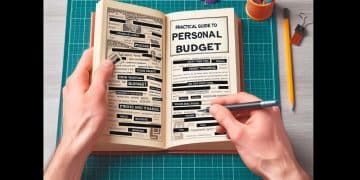Master Your Personal Budget: Effective Financial Control Tips


Maintaining financial stability in our fast-paced society is more challenging than ever. Many individuals often live paycheck to paycheck, struggling with expenses due to inadequate financial planning. Personal budgeting offers a solution by empowering people to manage their finances, make informed decisions, and avoid unnecessary debt. This article explores personal budgeting essentials, providing practical tips and strategies for effective financial organization.
Anúncios
A well-structured budget serves as a financial blueprint. It ensures that individuals allocate funds wisely, enabling them to meet immediate needs while working toward long-term goals. Beyond simply tracking expenses, budgeting is about making conscious financial choices, promoting both savings and investments. By prioritizing budgeting, one gains peace of mind, knowing there’s a plan in place to foster a stable financial future.
Recognizing money management’s importance is the first step to financial freedom. Personal budgeting isn’t merely about restricting expenses; it’s a proactive approach to understanding one’s financial position. Proper budgeting helps pinpoint areas for cost reduction, boosts savings, and allows for informed planning for the future. The following sections will guide you through creating an effective budgeting plan tailored to your personal needs.
Creating a personal budget involves several crucial steps. First, evaluate your current financial status by tracking income, fixed, and variable expenses. Fixed expenses include rent and bills, while variable ones encompass groceries and entertainment. By monitoring these over a few months, you’ll gain a clear picture of your spending habits.
Next, setting financial goals is vital. Identify both short and long-term objectives, such as saving for emergencies, paying off high-interest debts, or allocating funds for major purchases. Clear goals provide direction and help maintain focus on what’s financially important.
A practical method for budget organization is the 50/30/20 rule. This framework suggests dividing income into 50% for needs, 30% for wants, and 20% for savings and debt repayment. This rule provides a balanced approach to managing both essentials and desires while building a financial cushion.
Regularly reviewing and adjusting your budget is key to staying on track. Financial circumstances change, and it’s crucial to adapt. Make it a practice to compare actual monthly spending against your budget, adjusting as needed for accuracy and relevancy.
Overview of Personal Budgeting
In today’s economic climate, an adept approach to budgeting is essential for financial health. Personal budgeting guides decisions on spending, saving, and investing, playing a central role in achieving financial objectives. Through careful planning and insightful analysis, budgeting not only addresses immediate financial demands but also lays the groundwork for a secure future.
Technology offers invaluable support for budget management. Various apps and tools can streamline the budgeting process, providing reminders for bills and insights into spending habits. Utilizing these technologies can make personal finance management less daunting and more efficient.
Common budgeting errors often include failing to account for all expenses or setting unrealistic limits. Overlooking small expenditures can lead to budget inaccuracies, while overly strict limits may deter budgeting efforts altogether. Realistic, flexible budgeting accommodates life’s enjoyments while maintaining fiscal discipline.
It’s important to prioritize “paying yourself first.” This philosophy focuses on setting aside money for savings and debt payment before other expenses, ensuring your financial goals are prioritized and consistently addressed.
Characteristics of Personal Budgeting
- Organizes income and expenses for better management.
- Involves setting realistic financial goals.
- Encourages monitoring and adjustment with regular reviews.
- Incorporates technology for streamlined budget tracking.
Benefits of Personal Budgeting
Personal budgeting offers numerous benefits, paramount among them is financial clarity. By understanding exactly where your money goes, you can make informed financial decisions that propel you toward your goals. Budgets also promote savings, helping you build reserves for future needs or unexpected events.
With a structured budget, you can eliminate the stress of living paycheck to paycheck. It ensures that funds are available for life’s essentials, reducing financial anxiety and allowing for a more comfortable lifestyle. This financial predictability is crucial in today’s uncertain economic environment.
Budgets also protect against overspending. They set spending boundaries that keep your finances in check, preventing the accumulation of unnecessary debt. This way, you’re always aware of your spending limits, avoiding impulsive purchasing that could derail your finances.
Another significant benefit of budgeting is its facilitation of goal achievement. Whether it’s buying a home, traveling, or saving for retirement, a well-managed budget aligns daily financial choices with long-term aspirations, offering a clear path toward dreams.
In addition, personal budgeting fosters financial literacy. As you track your spending, you become more aware of financial patterns and behaviors, ultimately leading to smarter spending choices and efficient money management skills.





